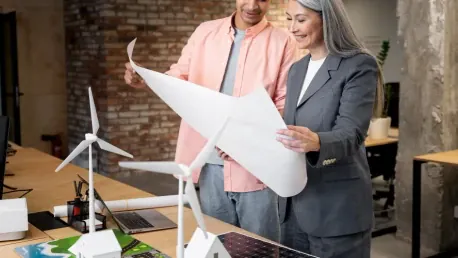As Vice President Kamala Harris navigates her evolving role in American energy policy, the call for a pragmatic balance between environmental concerns and economic growth intensifies. Previously known for her anti-“Big Oil” stance and advocacy for a federal fracking ban, Harris is now at a crossroads, needing to appeal to both steadfast environmental activists and moderate voters. Ryan P. Kellogg’s proposed pragmatic energy policy offers a roadmap that Harris could adopt, focusing on responsible natural gas development alongside renewable energy sources, all within the framework of the Biden administration’s Inflation Reduction Act (IRA).
Natural Gas Development alongside Renewables
Ryan P. Kellogg emphasizes that responsible natural gas production must coexist with investments in renewable energy to ensure both energy affordability and security. The balance aims to meet immediate energy needs while transitioning to cleaner, sustainable sources. Pennsylvania serves as an instructive case study, demonstrating how switching from coal to natural gas has significantly reduced carbon emissions. This success story lays out a model that could potentially be implemented on a national and even global scale, further decreasing greenhouse gas emissions.
The dual focus on natural gas and renewables echoes a growing consensus that diversified energy sources are critical for a balanced policy. Natural gas, considered a bridge fuel, could stabilize the energy market during the transition to renewable energy. Notably, Pennsylvania’s achievements in carbon reduction through natural gas could serve as a blueprint, inspiring similar policies across the U.S. and beyond. By championing this approach, Harris could appeal to environmentalists who demand immediate action on climate change and moderates who prioritize economic stability.
The importance of responsible natural gas development cannot be overstated. Implementing stringent environmental safeguards is vital to ensure that natural gas production does not undermine long-term climate goals. This combined strategy could represent a comprehensive solution to the ongoing energy debate, merging the urgency of environmental sustainability with the pragmatism of economic needs.
Legislative and Regulatory Frameworks
Key to Kellogg’s proposal is leveraging the legislative groundwork laid by the Biden administration’s Inflation Reduction Act (IRA). The IRA has already initiated substantial funding for emissions reduction technologies such as AI-powered satellite monitoring and real-time leak detection. These innovations aim to make natural gas production more environmentally viable, maintaining rigorous environmental standards while supporting energy production.
Building on this foundation, Kellogg advocates for three primary policy changes. First, ending the freeze on LNG (Liquefied Natural Gas) export permits is crucial for expanding the U.S. role in global energy markets. Second, passing energy permitting reform legislation would streamline processes, enabling the efficient development of both natural gas and renewable energy infrastructures. Lastly, promoting U.S. leadership in emissions monitoring and capture technology ensures that environmental protections are not compromised.
These legislative and regulatory enhancements would not only sustain but also accelerate the transition to cleaner energy sources. By adopting these changes, Harris could effectively balance the need for immediate energy solutions with the long-term goal of comprehensive climate action. Establishing robust regulatory frameworks will be essential for maintaining this delicate balance.
Global Context and Coal-to-Gas Transition
The implications of this energy policy extend beyond U.S. borders, particularly in mitigating global climate change. Kellogg highlights that the transition from coal to natural gas is a crucial step for reducing global reliance on coal, especially in the Global South, where emissions growth is projected to surge. Increasing U.S. LNG exports could facilitate a global coal-to-gas transition, presenting a pragmatic solution for international climate goals.
Encouraging this global transition would not only lower greenhouse gas emissions but also foster international cooperation in climate action. U.S. leadership in this domain could inspire other nations to follow suit, collectively reducing global emissions. Harris could leverage this policy to fortify international alliances and enhance America’s standing as a leader in environmental stewardship.
Furthermore, promoting this transition would support economic opportunities for U.S. natural gas producers, opening new markets while contributing to global climate efforts. The coal-to-gas transition embodies a practical yet impactful strategy that aligns with both environmental and economic objectives. By championing this global perspective, Harris can present a united front on climate action.
Economic and Security Benefits
As Vice President Kamala Harris navigates her evolving role in shaping American energy policy, the demand for a sensible balance between environmental concerns and economic growth becomes more pressing. Previously, Harris was known for her strong opposition to “Big Oil” and her advocacy for a federal fracking ban. However, she now stands at a pivotal juncture, aiming to satisfy both committed environmentalists and moderate voters. A pragmatic energy policy proposed by Ryan P. Kellogg offers a potential path forward for Harris. It emphasizes responsible natural gas development along with renewable energy sources, aligning with the goals set forth in the Biden administration’s Inflation Reduction Act (IRA). This balanced approach could bridge the gap between environmental aspirations and economic realities, positioning Harris as a leader capable of advancing a comprehensive and inclusive energy strategy in the United States.









